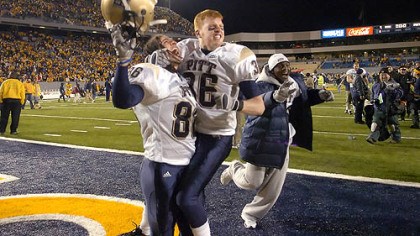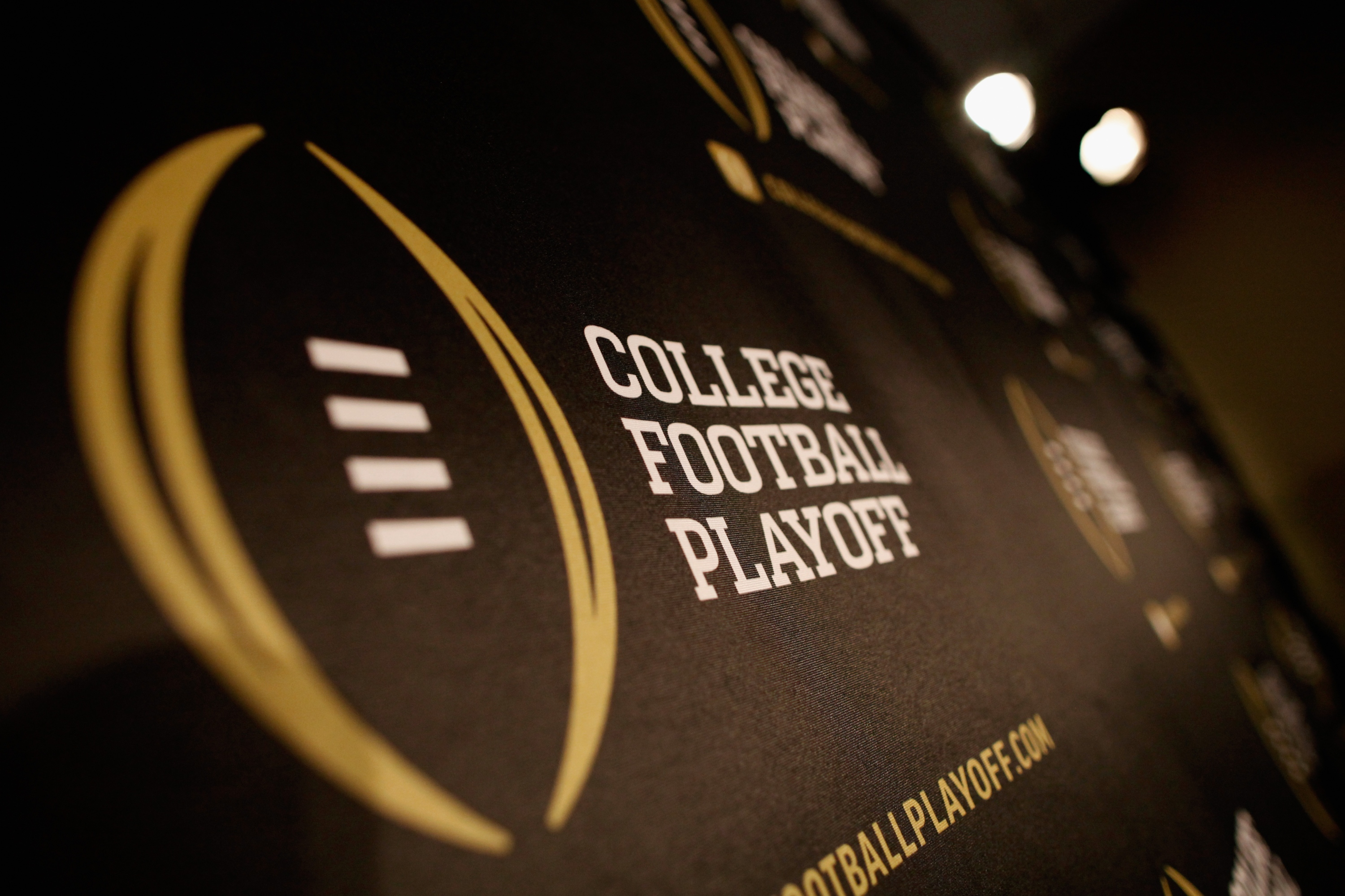Let me start by saying that I support playoff expansion. I believe that it's inevitable and, as long as there are five major conferences, necessary. I won't delve into that debate, except to point out that eventual 2014 CFP champion and world beater Ohio State was nearly left out of the playoff field. Take a minute to think about that.
While you were pondering that absurd notion, Ezekiel Elliot just scored another rushing touchdown against Oregon.
Now that you're on board with playoff expansion, let's get to the real issue at hand. To me, the bigger question to me is not "if" or even "when" but "how". The "how" of CFP expansion is something that could make or break the sport as we know it.
I've heard about a hundred different ideas for how to expand, so let's just focus on one popular variant from Michael Rosenberg of SI, outlined
here.
The proposal goes like this: Expand the field to 6 or 8 teams. The champion of each Power 5 conference gets an automatic bid. The remaining spots are at-large. If we go with 6 teams, #1 and #2 get a first round bye. If we have 8 teams, #1 through #4 get first round home-field advantage. The idea is to make it more similar to the NFL's predictable playoff system.
I see the appeal. It's simple and logical. You know exactly what you need to do to reach the playoffs: If you win your conference, you're in; If you don't, you still have a shot, but nothing is guaranteed. There are a number of problems, though, and I think the best way to highlight those is to examine how this would have played out last season.
With a 6 team field, you would have had this year's final four (SEC champ Alabama, PAC-12 champ Oregon, ACC champ Florida State, and Big Ten champ Ohio State) plus Baylor and TCU (the Big 12 would be forced to select one to be the league champion, but it's logical to think that the other team would have earned the at-large bid). With 8 teams, you would have the same 6 as above, plus Mississippi State and Michigan State (most likely), as they were the only other remaining Power 5 teams with less than 3 losses. Both scenarios look great, right?
But, let's try something to illustrate a point. Rewind back to November 29, 2014. It's rivalry week, just 8 days before the CFP committee makes their final selections. #1 Alabama faces Auburn in the Iron Bowl, #2 Oregon takes on Oregon State in the Civil War, #4 Florida State plays bitter rival Florida, and #5 Ohio State takes the field against Michigan in The Game.
For these teams, the stakes are higher than ever. Win and they move one step closer to the playoffs, lose and they're all but eliminated from contention. At least, that's how it is in the current system. Now imagine we have the expanded system in place. In the case of all of the aforementioned teams, they had clinched their division at the start of these games and, in turn, a spot in their respective conference championship. So, any or all of them could have lost to their rival and still gone on to win their conference and make the playoffs via automatic bid. The top 6 or 8 would essentially look the same (except for seeding, perhaps) regardless of the outcome of these games.
All of a sudden, rivalry week goes from one of the most exciting aspects of the college football season to a potential snooze-fest. Sure, for the followers of teams involved in a specific rivalry the appeal remains; most die-hard fans will tell you a rivalry game trumps all else, and standings pretty much go out the window when they take the field. But let's be honest, the standings still do matter, even to the most insanely passionate fan, perhaps more so if you think about it. If any one of Auburn, Oregon State, Florida, or Michigan had pulled off the upset and knocked their respective rival out of the playoffs, don't you think it would have been that much sweeter for them, and that much harder for the other team to stomach, knowing a national championship was potentially on the line? But with an expanded playoff the underdog could win that game and still watch their foe hoist the playoff trophy in January.
And for college football fans around the country, it makes a world of difference. Do you think these rivalry games would have the same excitement factor if they didn't have playoff implications? The 2014 edition of the Iron Bowl had the
highest ratings of any regular season college football game on ESPN. Ever. Do you think that still would have been the case if it had no playoff implications? If I'm an Ohio State fan or a Baylor fan or a TCU fan, I don't really care if Auburn beats Alabama if the Tide can get in the top 6 or 8 regardless. But in today's system, you better believe every Buckeye, Bear, and Horned Frog was tuned in, screaming "War Damn Eagle" the whole time.
Sure, seeding would still be at stake, which could be a big advantage, depending on what kind of benefits are given. But it's just not the same as the all-or-nothing mentality of college football today. The chaos factor is one of the best parts of the sport. I still remember a weekend in early December, 2007, when #1 Missouri and #2 West Virginia entered games against Oklahoma and Pitt, respectively, looking to clinch spots in the championship game. In the span of a few hours both #1 and #2 lost and were out of title contention. The result was pure madness, as multiple teams vied for the top two spots. It was glorious fun that only college football could provide. Please tell me the last time week 17 of the NFL schedule was that exciting or memorable. I'll wait.

Speaking of NFL's week 17, could you imagine if coaches started treating rivalry week like that pathetic excuse for a football Sunday? It might seem unfathomable now for coaches to sit key players in rivalry games, but imagine if the unthinkable happens and your team loses a star to injury in a game that essentially doesn't affect your chances at a national title. Could you really blame the coach if the following year he errs on the side of caution and rests up some guys, especially any that are already dealing with lingering injuries? Sure, it sounds awful, but playing your superhuman quarterback (who is actually 100% human and has gotten beat up all season) might secure a win against your rival but end up costing you a shot at a championship. Remember: not everyone has a third-string quarterback who can step in for his first career start and do
this. The coach in such a situation would essentially be faced with the decision of playing to beat the rival or playing for a national championship. The idea of any coach, player, or fan having to even consider such a dilemma is absolutely nauseating.
There's also the possibility that a conference champion would have no business even coming near a playoff. In 2012, a five-loss Wisconsin team won the Big Ten. The same year, 6-6 UCLA made the PAC-12 title game (and then got smashed by Oregon). Of course, both cases were only possible because of NCAA sanctions against other teams, but it's happened before and it will happen again, and these are just the most extreme examples. I don't know about you, but I want to avoid seeing a team with 3 or 4 losses getting hammered in the playoffs when a more worthy 1 or 2 loss team sits at home and watches.

Then, there is the matter of non-conference games. With automatic bids to conference champs, the importance of such games goes way down. Sure, coaches might be more willing to schedule tougher opponents, but at what cost? Do I really care to watch a top-ten non-conference clash of the titans if both teams can go on and win their conference and get in the playoffs automatically anyway? And while it is certainly possible to still make it into the playoffs in the current system after losing an early non-conference game (just ask the Buckeyes), the perspective at the time of the game is vastly different when you know a conference title earns an automatic berth.
Automatic bids just take away too much of the uncertainty that makes college football so exciting. That's why the proposed solution (or any solution) which has conference champs getting a free pass just won't work. For now, the current 4-team system will do just fine. We will have to expand eventually, and I have some ideas for how to do it, which I will revisit in another post. But whatever happens, the importance of rivalry week and non-conference games must be preserved. There's too much tradition, and frankly, too much fun involved in both to devalue them in any way. It won't be predictable, but if you want predictability, watch the NFL. Me? I'll take the unadulterated chaos of college football.









